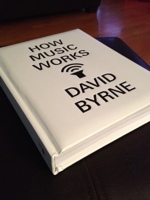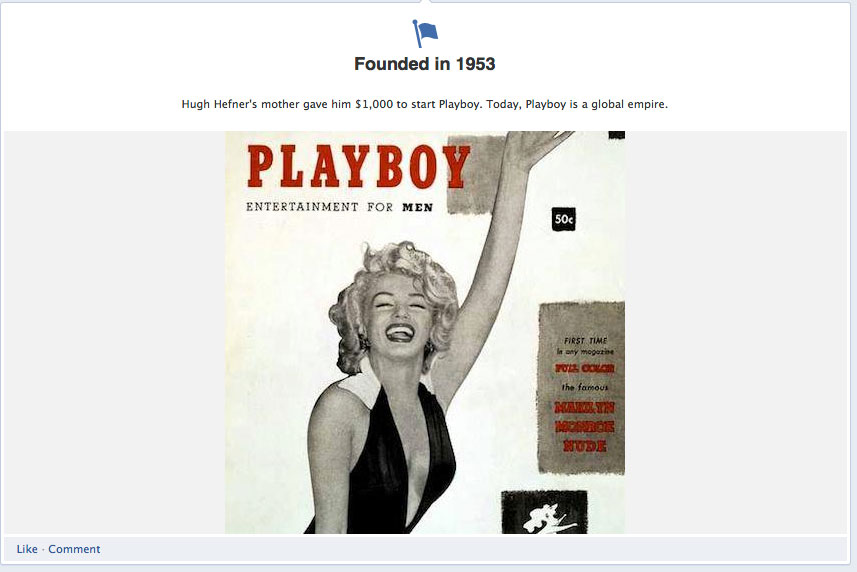Here’s my piece from last week’s Paper Machete. You can read my previous pieces for the Machete here. (UPDATE: WBEZ has the audio of this piece here.)
Back in 2009, I wrote and performed a piece about life at Playboy for You, Me, Them, Everybody (before it was a talk show when it was an evening of readings and performances). None of my other ideas for that night panned out so I threw a framework around a few anecdotes I’d share at parties about work. The best thing I can say about my performance is…I met the lead singer of White Mystery that night and she was really cool. The piece was a dud. Didn’t play well in the room and reading it three years later I can see why. I come across as pompous and the piece has nothing interesting to say about me or the experience of working there. (I never posted it.)
I’d always wanted to revisit Playboy as a topic and talk less about what it was like to work there and more about where that brand is in the current cultural landscape. But the press coverage I’d garnered thanks to tweeting (and talking) about my departure earned me a cease-and-desist letter from Playboy so writing about it would mean writing less about my very brief time there and more about what happened since then.
My appearance at The Paper Machete last week coincided with the last days of Playboy in Chicago and followed a mash note from Hugh Hefner to the city in the Chicago Tribune. I finally felt like I had something worthwhile to say and Christopher Piatt – the EIC of the Machete – liked my pitch so it seemed time to revisit the topic. The Machete keeps to a strict word count for time and this is one of those pieces where I was both writing up until my deadline but also struggling to get all the ideas in without going over. Part of me wants to have another go at it but once you connect with the ball you don’t linger, you just head to first.
—
There are few things sadder than throwing your own going-away party. But that’s exactly what Hugh Hefner did this past Sunday in the pages of the Chicago Tribune. To mark the departure of Playboy magazine’s editorial operations for Los Angeles, America’s horniest octogenarian threw one last party via an 800 word, misty-eyed eulogy to Playboy’s nearly 60 years in Chicago.
He was one of the few who marked the occasion. There was no retrospective in the city’s glossy culture magazines, no historical timeline in either of the daily newspapers. Even television news, which rarely passes on an opportunity to cover newsworthy nudity, didn’t seem particularly interested. Aside from an op-ed here or radio segment there, Playboy’s departure from the city of its birth went largely unnoticed.
Perhaps it’s because you only get one going-away party. Playboy, for all intents and purposes, left Chicago in the mid-1970s when Hefner – after decades in the first Playboy Mansion on State Street – headed west to establish a new mansion in the Holmby Hills neighborhood of Los Angeles.
Now, before I go on I want to offer some disclosure: From March of 2009 to March of 2010, I worked for Playboy.com, first as its Senior Editor then as is its Director of Content. I stopped working as Playboy.com’s Director of Content when Playboy…ordered me to. More specifically someone from HR ordered me to in a conversation that featured the words “severance” and “can stay until the end of the day…if you want.” But the year in between was a lot of fun. It’s hard to bear too much ill will toward a job that once asked me to write a script for something called “Playboy’s Naked Yoga.” That’s right, I said a script.
Any personal animus I might bear toward the organization is tempered with affection. I’m more a fan of Chicago than almost anything and knowing this city was the birthplace of THE iconic magazine brand of the 20th century ought to be a point of pride for anyone who calls Chicago home and particularly for someone like me who’s spent his formative working years in media.
In his Tribune piece, Hefner offered a detailed highlight reel of the magazine’s first 20 years in Chicago including the Hyde Park apartment where he laid out the first issue, the first Playboy Jazz Festival in 1959 at the old Chicago Stadium, the first Playboy Club in 1960, and the company’s move into the Palmolive Building in 1965 with its nine foot high letters spelling out Playboy. And then the following:
By the mid-1970s, I moved to Los Angeles, the land where my dreams had come from, but Chicago remained the company’s base, headquartered in the Lake Shore Drive offices we’ve occupied since 1989.
Now, after nearly 60 years, the Playboy offices in Chicago have closed as we consolidate our operations in Los Angeles.
So by Hef’s own admission, there’s been nothing worth mentioning about Playboy’s time in Chicago since the first Bush administration. At least from his point of view.
And this is exactly the problem with Playboy magazine: It’s all from his point of view and long ago stopped leading the culture in favor of following it. Last month’s cover promised features on The Walking Dead, Bruno Mars, Jon Hamm and Meghan McCain. Contemporary, sure. But territory most other modern major magazines had already covered.
In the book Mr Playboy author Steven Watts quotes Hefner as saying “I’ve always edited the magazine for myself, on the assumption that my tastes are pretty much like those of our readers. This was fine when Hef was in his 30s. But now a magazine that’s supposed to be about contemporary culture and aspiration is trapped in amber, held hostage by a 84 year old who long ago sought to wall himself off from the concerns of the everyday man.
I can’t remember where I read it now but Hefner said he moved into the Chicago mansion, in part, because it allowed him to centralize his work and social lives. This freed him, he said, from worrying about pedestrian things like how he was going to get to work or what he was going to wear that day. I suppose life is easier when you can go to work in your pajamas. But eventually the young men who were Playboy’s core audience – and had to worry about things like wearing pants and getting to work on time – realized Hef and his magazine didn’t have much to say to them. Do people still want to visit the Mansion in L.A.? Sure. But people still want to visit Disneyworld. But nobody ever talks about wanting to live there.
A couple years ago, Playboy’s CEO said the company was going to shift to “brand management” as its core strategy with an emphasis on opening new Playboy Clubs around the world. Essentially, Playboy as a company was going to be about being Playboy. The trouble is the modern Playboy brand – particularly the clubs – isn’t all that strong. Last year’s NBC TV show “The Playboy Club” – a show about its Hefnerian heyday that essentially said life stopped being cool after the 1960s – got yanked off the air after three episodes. Rumors of a Chicago Playboy Club re-opening after a 20 year absence turned out to be little more than trumped-up publicity for the show. Even The Playboy Club casino at the Palms in Las Vegas is closing. It almost sounds like a bad joke. “Your mama’s so dumb she couldn’t even keep a Playboy Club open in Las Vegas.”
Two events last year symbolized both Playboy’s reversal of fortune over the past couple decades and its reaction to it. First, Playboy sold off its online business to a company called Manwin. You’ve probably never heard of Manwin but they run a whole bunch of websites that offer free porn on the Internet. It’s exactly the kind of company that’s made it hard for Playboy to make money online. So hard that Playboy decided to get out of the business altogether then turn around and sell it to the very people who put them in that position in the first place. Also notable was Hefner’s decision to take Playboy from a publicly-traded company available on the New York Stock Exchange to a private company controlled largely by him. It was yet another example of Hef doing everything he can to turn inward keep his world free from external forces.
So if this week’s end of Playboy’s party in Chicago was met with a collective shrug it shouldn’t have been a surprise. The party’s location was really far away and seemed like it’d been over for a while now. Plus, Hef was the only one on the list.

